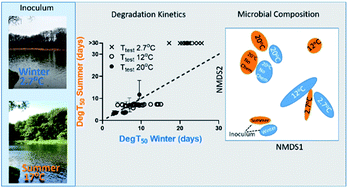Linking biodegradation kinetics, microbial composition and test temperature – Testing 40 petroleum hydrocarbons using inocula collected in winter and summer†
Abstract
Many factors affect the biodegradation kinetics of chemicals in test systems and the environment. Empirical knowledge is needed on how much test temperature, inoculum, test substances and co-substrates influence the biodegradation kinetics and microbial composition in the test. Water was sampled from the Gudenaa river in winter (2.7 °C) and summer (17 °C) (microbial inoculum) and combined with an aqueous stock solution of >40 petroleum hydrocarbons prepared by passive dosing. This resulted in low-concentration test systems that were incubated for 30 days at 2.7, 12 and 20 °C. Primary biodegradation kinetics, based on substrate depletion relative to abiotic controls, were determined with automated Solid Phase Microextraction coupled to GC/MS. Biodegradation kinetics were remarkably similar for summer and winter inocula when tested at the same temperature, except when cooling summer inoculum to 2.7 °C which delayed degradation relative to winter inoculum. Amplicon sequencing was applied to determine shifts in the microbial composition between season and during incubations: (1) the microbial composition of summer and winter inocula were remarkably similar, (2) the incubation and the incubation temperature had both a clear impact on the microbial composition and (3) the effect of adding >40 petroleum hydrocarbons at low test concentrations was limited but resulted in some proliferation of the known petroleum hydrocarbon degraders Nevskia and Sulfuritalea. Overall, biodegradation kinetics and its temperature dependency were very similar for winter and summer inoculum, whereas the microbial composition was more affected by incubation and test temperature compared to the addition of test chemicals at low concentrations.

- This article is part of the themed collection: Contaminant remediation and fate


 Please wait while we load your content...
Please wait while we load your content...